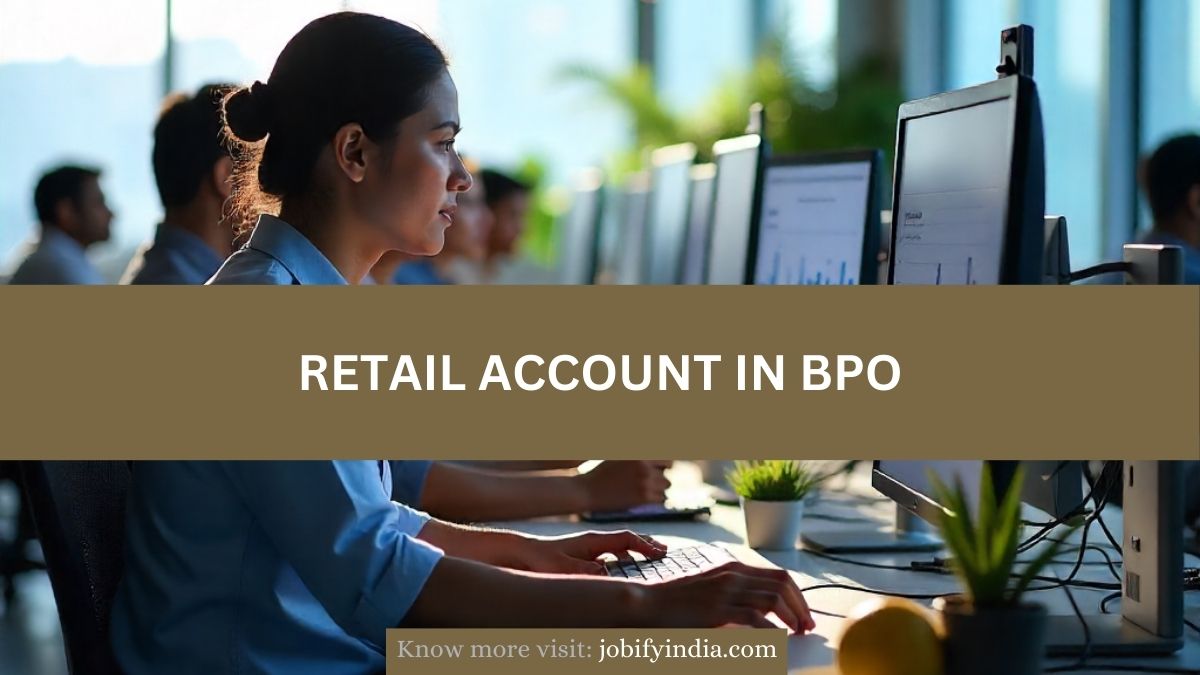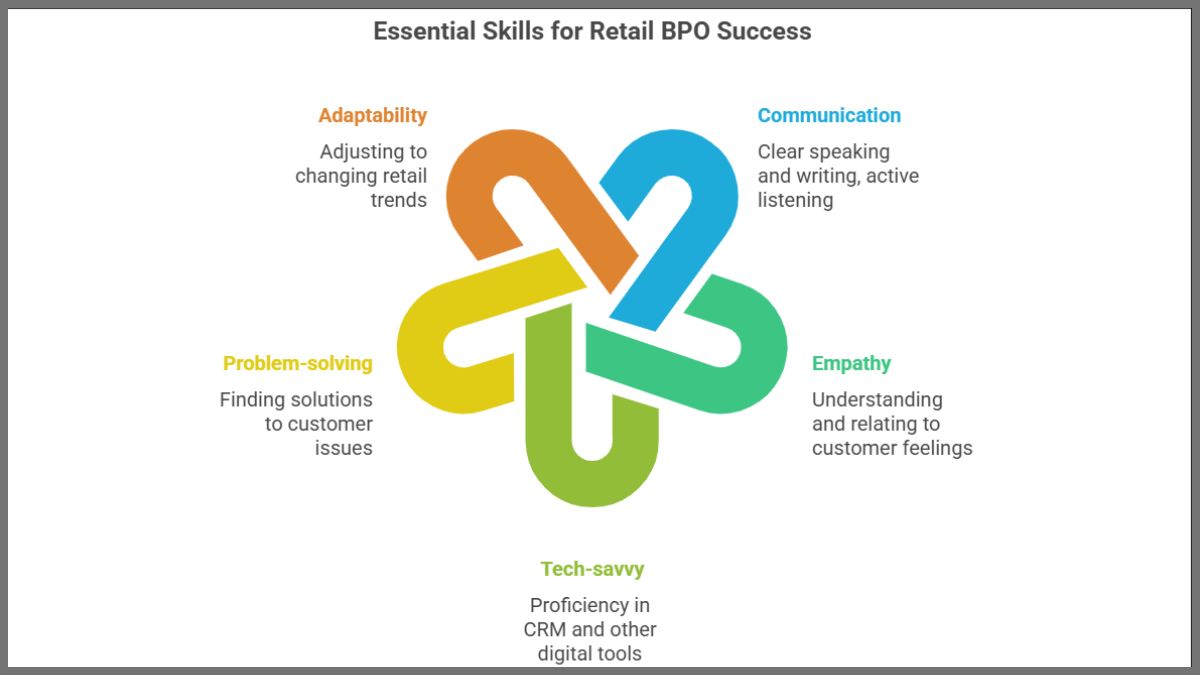In today’s rapidly evolving business world, the retail industry is leaning more than ever on Business Process Outsourcing (BPO) to improve customer service, streamline operations, and cut costs. If you’ve ever wondered what a retail account in BPO means, you’re in the right place.
Whether you’re aiming to land a job in the BPO industry or just want to stay updated with business trends, understanding the function and importance of retail accounts in BPO can give you a valuable edge.
Let’s break it down in everyday language.
What is a Retail Account in BPO?
Imagine you’re shopping online for clothes. If something goes wrong—say your package is delayed, your payment doesn’t go through, or you want to return an item—you’ll probably contact customer service. In many cases, the person helping you doesn’t work directly for the clothing company. They might work for a BPO handling the company’s retail account.
A retail account in BPO refers to a partnership between a retail company (like an e-commerce store, fashion brand, or tech retailer) and a BPO provider that manages certain business processes—usually customer-facing tasks such as:
- Customer support
- Order processing and tracking
- Returns and refunds
- Inventory management
- Sales assistance
Why Retailers Partner with BPOs
So why do big retail brands outsource these services instead of handling everything in-house? Good question.
Here are a few compelling reasons:
- Cost savings: Hiring and training a full support team can be expensive. BPOs reduce operational costs without sacrificing quality.
- Scalability: Need more agents during the holiday shopping rush? BPOs can quickly scale up services to match demand.
- 24/7 support: Many BPO companies offer round-the-clock customer service, keeping customers happy across different time zones.
- Expertise: BPOs specialize in handling customer service efficiently using proven tools and techniques.
Key Roles in a Retail BPO Account
A retail BPO account isn’t just one person answering phone calls. It involves a team of professionals working together smoothly.
Here are some of the main roles you’ll find:
1. Customer Service Representatives (CSRs)
These are the frontliners. CSRs answer phone calls, respond to emails or chats, and help customers solve their problems. They need patience, empathy, and good communication skills.
2. Team Leaders
Team Leaders supervise the CSRs, making sure they meet performance targets. They also help with training, coaching, and handling escalated issues.
3. Quality Analysts
These individuals review calls and chats to ensure everything meets quality standards. They help spot areas where agents can improve.
4. Trainers
Every retail brand is different. Trainers help new employees understand the products, services, tools, and protocols of the specific retail account.
5. Operations Managers
They oversee the entire retail account, liaising with the client, managing workloads, and ensuring service level agreements (SLAs) are met.
Common Functions Handled in Retail BPOs
Not all accounts are created equal. Depending on the client and type of retail store, BPOs may handle a wide range of tasks. Here’s a closer look at some core functions:
1. Order Management
Processing incoming orders, ensuring accuracy, and solving payment-related issues are all part of the job.
2. Shipping and Delivery Support
BPO agents assist customers with shipping inquiries, tracking orders, and resolving late delivery problems.
3. Returns and Refunds
One of the trickiest parts of retail. BPO teams make sure returns are logged and refunds are processed promptly and fairly.
4. Product Information Assistance
Agents answer customer queries about product details—size, availability, compatibility, ingredients, etc.
5. Upselling and Cross-selling
Some retail accounts also involve sales tasks. Agents are trained to suggest additional items that a customer might want.
Skills That Make You Successful in a Retail BPO Account
If you’re thinking about working in a BPO retail account, here are some skills that can help you stand out:
- Communication: Speak and write clearly. Listen carefully to customers to understand their needs.
- Empathy: Put yourself in the customer’s shoes. Even frustrated callers want to be heard and understood.
- Tech-savvy: BPOs use a variety of tools such as CRM software, order tracking systems, and chat platforms.
- Problem-solving: Always be thinking: “How can I fix this for the customer?”
- Adaptability: Retail trends change fast, so expect to learn new things all the time.
How Technology is Transforming Retail BPO in 2025
Now let’s take a look at what’s happening in 2025. Like many industries, retail BPO is going through rapid digital transformation. Here’s how:
- AI-powered chatbots: These are now handling basic customer service queries, freeing up human agents to manage more complex issues.
- Omnichannel integration: BPOs today interact with customers via phone, chat, email, social media, and even text—in one smooth experience.
- Data analytics: Insights from customer interactions help brands understand what’s working and what’s not.
- Cloud technology: It allows remote work, faster communication, and greater information security.
In fact, according to a Grand View Research report published in early 2024, the global retail BPO market is expected to grow at a compound annual growth rate (CAGR) of 8.5% from 2024 to 2030, driven by increased digital adoption and the growing demand for customer-centric services.
What’s the Future of Retail Accounts in BPO?
Retail is not just about selling anymore—it’s about creating experiences. BPOs play a big role in that experience. As long as people continue to shop—online or in-store—there will be demand for skilled professionals who can make that experience smooth and satisfying.
Also, as voice assistants, AI, and personalized marketing become more common, retail BPO accounts will evolve, requiring agents to become more tech-fluent and adaptive.
Final Thoughts
Working within a retail account in BPO offers a front-row seat to how big brands interact with customers. It’s a dynamic, fast-paced environment that values communication, empathy, and quick thinking.
Whether you’re considering a role in the BPO industry or just want a better grasp of how your favorite brand handles your queries, retail BPO accounts are a behind-the-scenes powerhouse you’ll want to appreciate.
Got any thoughts or questions about working in a retail BPO? Leave a comment below—we’d love to hear from you!





